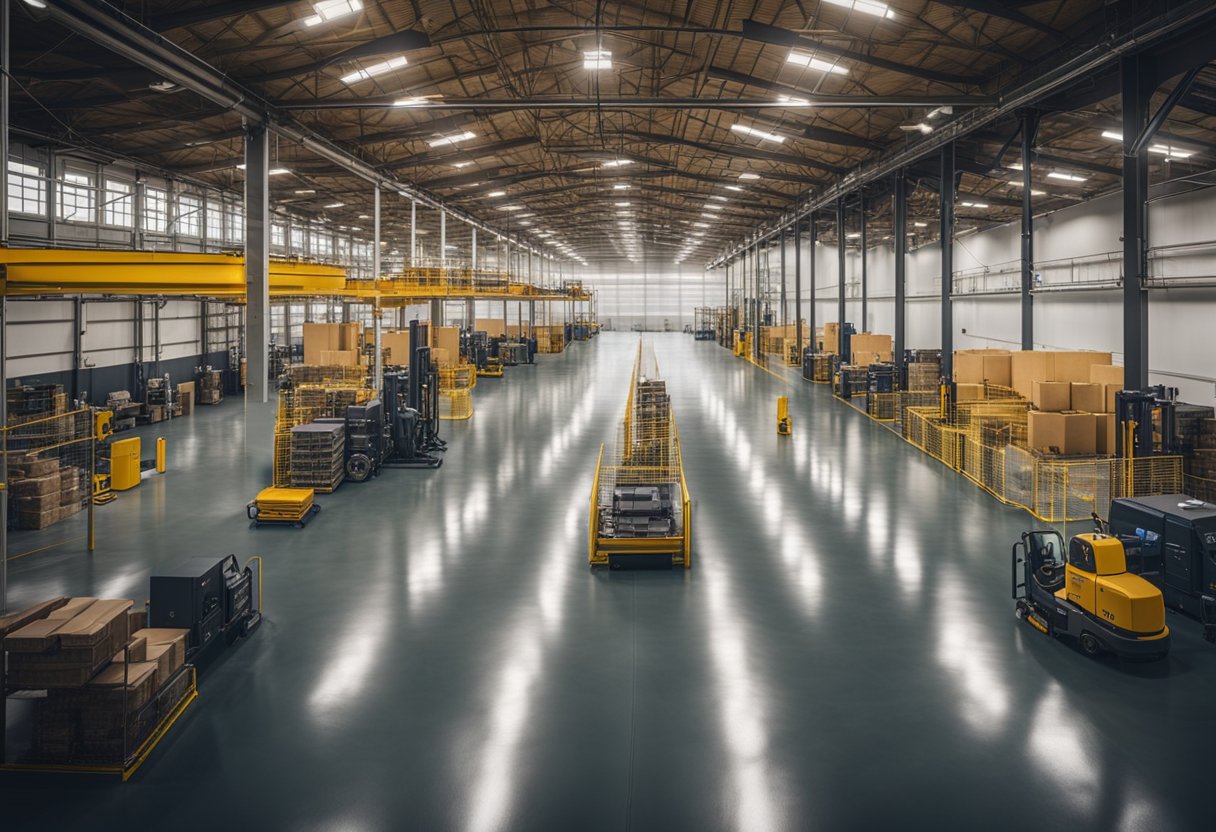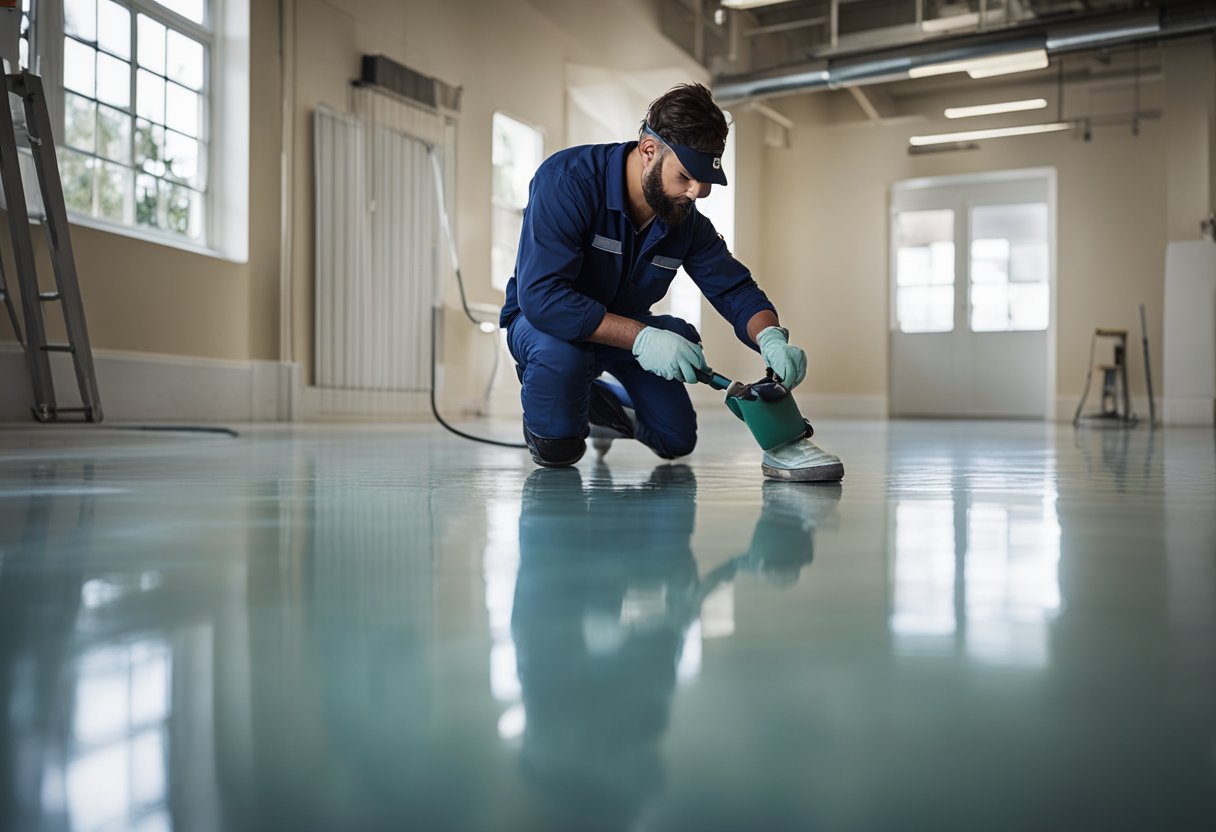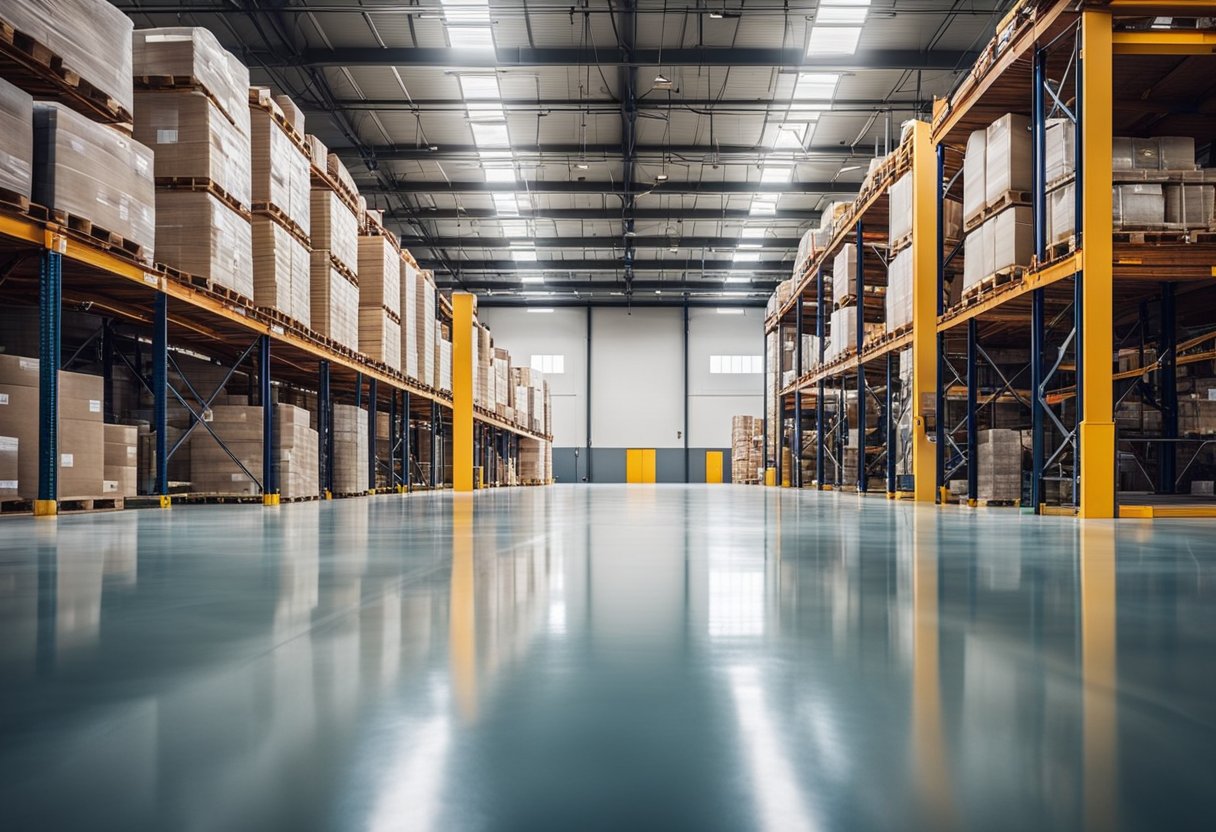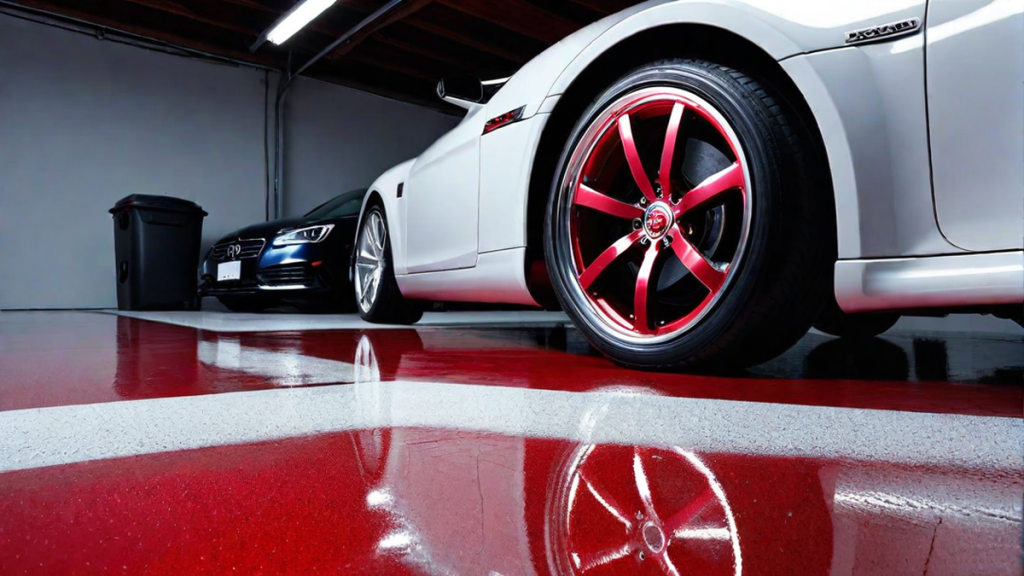Oakland epoxy flooring is gaining traction as a durable and aesthetic solution for both commercial and residential floors. Recognized for its resilience and longevity, epoxy flooring is a composite material that forms a smooth, finished surface over concrete floors. Composed of resin and a hardener, when mixed together, they create a chemical reaction that results in a sturdy plastic material that adheres to the substrate.

Epoxy flooring is not only tough against day-to-day wear and tear but also provides a sleek appearance that is customizable with a variety of colors and textures. Its seamless surface is highly resistant to spills, stains, and chemicals, making it an ideal choice for environments such as garages, hospitals, industrial facilities, and kitchens. Moreover, the installation process, though detailed, offers long-term benefits, reducing the need for frequent repairs and maintenance.
Key Takeaways
- Epoxy flooring offers durability and a customizable aesthetic for various environments.
- Its chemical resistance and low maintenance needs are suitable for both commercial and residential applications.
- Professional installation is crucial for ensuring long-lasting performance and adherence to safety standards.
Understanding Epoxy Flooring

Epoxy flooring refers to a floor surface composed of multiple layers of epoxy applied to a floor with a depth of at least two millimeters. Epoxy itself is formed from two main components – resins and hardeners. When mixed, they react chemically to form a rigid plastic material that is strong, resistant to degradation, and bonds exceptionally well to its substrate.
Types of Epoxy Flooring:
- Self-Leveling Epoxy Floors: Ideal for creating a smooth and level surface on new or old concrete floors.
- Epoxy Mortar Floors: Renowned for their high durability and strength, suited for industrial environments.
- Epoxy Flake Floors: Containing colored flake materials for aesthetic purposes, providing an anti-slip surface.
Applications:
Epoxy flooring is a versatile solution applicable across various sectors:
- Industrial: Used in manufacturing plants and warehouses due to its durability and resistance to heavy machinery.
- Commercial: Common in retail spaces, showrooms, and commercial buildings for its aesthetic appeal and longevity.
- Residential: Increasingly popular in homes for garages and basements given its ease of maintenance and resistance to stains.
Benefits:
- Durability and Strength: Epoxy floors are highly resistant to weight, traffic, impact, and chemicals.
- Aesthetic Options: Available in various colors and patterns to fit design needs.
- Safety Features: Can be enhanced with anti-slip additives.
- Maintenance: Easy to clean surfaces resist water and stains.
Installation Considerations:
For optimal results, concrete substrates require preparation through cleaning and profiling. Proper installation by professionals ensures longevity and performance of the epoxy flooring. Environmental factors such as temperature and humidity play crucial roles during application and curing.
Benefits of Epoxy Floors

Epoxy floors provide an array of advantages suitable for various settings such as garages, industrial spaces, and commercial buildings. Durability is one of the primary benefits of an epoxy coating on concrete floors. They can withstand heavy traffic and resist wear, making them last longer than many other flooring options. This resilience makes them a cost-effective solution in the long term.
Ease of cleaning is another significant advantage. The seamless surface of epoxy floors means there are no cracks or crevices for dirt to hide, making them very easy to maintain. Regular sweeping and occasional mopping with mild cleaners are enough to keep them looking pristine.
When it comes to maintenance, epoxy floors require far less than traditional flooring options. Their non-porous surface repels stains, preventing the absorption of substances which could lead to permanent damage. Small scratches or marks can often be polished out without the need for extensive repairs.
Safety features like anti-slip additives can be incorporated within the epoxy mixture, enhancing the safety of the flooring. Epoxy floors can be textured to give additional grip in areas that are prone to moisture, thus reducing the risk of slips and falls.
Finally, epoxy flooring is customizable. They can be tinted with color, have decorative chips added for a terrazzo-like finish, or be applied in patterns to demarcate specific areas. This customization allows businesses and homeowners to tailor the appearance to their specific aesthetic or functional needs.
Types of Epoxy Coatings

Epoxy coatings for flooring come in various types with distinctive characteristics and aesthetics to suit different applications. They offer durability and an attractive finish that can withstand heavy use. Below are the specific types found in Oakland Epoxy Flooring options.
Epoxy Flake Floors
Epoxy flake floors incorporate colored chips or flakes laid within the epoxy to create a vibrant, multi-hued surface. The flakes provide not only a unique look but also enhance the floor’s slip resistance. They are available in a range of colors and sizes, allowing for customization according to a client’s preferences.
- Colors: Wide variety, customizable
- Application: Commercial, industrial, and residential
- Advantages:
- Customizable look
- Improved slip resistance
Metallic Epoxy Floors
Metallic epoxy floors are known for their striking, glossy finish that resembles a shimmering metallic surface. These floors use metallic additives mixed into clear epoxy to create depth and movement, resembling patterns found in marble or natural stone. Each floor is unique due to the fluid patterns achieved during application.
- Colors: Various metallic shades
- Application: Showrooms, lobbies, residential spaces
- Characteristics:
- Glossy, reflective finish
- Unique, artistic patterns
Solid Epoxy Floors
Solid epoxy floors are characterized by their seamless, uniform color that offers a clean and professional look. They are often chosen for their simplicity and ease of maintenance. Suitable for areas that require a hygienic and easy-to-clean surface, they resist stains and spills effectively.
- Colors: Nearly any solid color
- Application: Garages, kitchens, hospitals, industrial spaces
- Benefits:
- Low maintenance
- High durability
- Seamless finish
Application Areas for Epoxy Flooring

Epoxy flooring offers durable and aesthetically appealing solutions for a variety of spaces, including commercial settings, industrial warehouses, and residential areas. This section will explore the specific environments where epoxy flooring is an optimal choice.
Commercial Epoxy Applications
Retail Spaces and Showrooms: Epoxy flooring in commercial environments, such as retail stores and showrooms, provides a high-gloss surface that can withstand heavy foot traffic and enhance lighting due to its reflective properties.
Food Service Areas: For commercial kitchens and food service areas, an epoxy floor is beneficial as it is easy to clean, resistant to stains, and meets hygienic standards. Plus, it’s capable of enduring the spillage of hot liquids and heavy traffic.
Industrial Epoxy Solutions
Manufacturing Plants: In industrial settings like manufacturing plants, epoxy flooring is valued for its resilience to chemicals, high impact, and heavy machinery.
Warehouses: Warehouses benefit from epoxy flooring as it withstands constant forklift movement and heavy loads, providing a safe and long-lasting surface.
Residential Epoxy Installations
Garages: Homeowners often choose epoxy coatings for garages due to their resistance to oil stains, beads water, and is easy to wipe clean.
Basements and Bathrooms: For basements and bathrooms, epoxy proves ideal as it combats moisture-related issues, creating a non-porous and water-resistant surface thus preventing mold or mildew.
Epoxy Flooring Installation Process

The installation process of epoxy flooring is critical to ensure durability and a high-quality finish. It demands meticulous attention to detail during each phase, from preparing the concrete surface to applying the epoxy coating and allowing it to cure properly. Adhering to these steps helps in providing a long-lasting floor with a warranty that assures its performance.
Surface Preparation
Proper surface preparation is fundamental in the epoxy flooring installation process. The concrete floor must be cleaned thoroughly to remove any dirt, grease, or oil. Any cracks or chips in the concrete should be repaired to create a smooth surface. It’s crucial to test the concrete for moisture as well because excessive moisture can prevent proper adhesion of the epoxy. Methods used for preparation include:
- Grinding
- Shot blasting
- Acid etching
Epoxy Coating Application
Epoxy coating application is executed in stages, starting with the primer coat that seals the concrete and ensures strong adhesion. The subsequent layers are the basecoat and topcoat, which provide the surface with its strength and aesthetic appeal. The epoxy should be mixed accurately according to manufacturer’s instructions. It’s applied evenly across the concrete surface, taking care to avoid bubbles and ensure full coverage. Tools often used for application include:
- Squeegees
- Rollers
- Brushes
Curing and Finishing
Curing is essential for epoxy flooring to achieve its full strength and durability. The newly applied epoxy must be allowed to cure for a period specified by the epoxy manufacturer. This timeframe can vary depending on the product and environmental conditions but typically ranges from several hours to days. Once cured, the floor is inspected for any imperfections, and a finishing coat can be applied for extra gloss and protection, completing the installation process. Properly cured epoxy flooring is resistant to many forms of wear and tear and comes with a warranty that varies by the constructor and product specifications.
Maintenance and Repair of Epoxy Floors

Epoxy flooring is renowned for its durability and longevity, but it still requires regular maintenance to preserve its appearance and extend its life. To ensure optimal performance, routine cleaning and occasional repairs should be part of the floor’s care regimen.
Cleaning Procedures:
- Daily Care: Epoxy floors should be swept daily to remove dirt and grit to avoid scratches.
- Spills: In the event of spills, they should be cleaned immediately with a soft cloth or mop to prevent staining.
- Mopping: Use a dust mop or a soft-bristle broom weekly to prevent dust buildup.
- Washing: Monthly cleaning with a mild soap and water solution is recommended, followed by rinsing with clean water.
Maintenance Tips:
- Mats: Place entrance mats to reduce the amount of dirt and grit on the surface.
- Furniture: Use protective pads under heavy furniture or appliances to prevent damage.
- Chemicals: Avoid using harsh chemicals that may deteriorate the epoxy coating.
Repair Guidelines:
- Scratches and Small Chips: Minor scratches and chips can often be repaired with a touch-up kit designed for epoxy flooring.
- Cracks: Address cracks promptly by cleaning the area and filling it with an epoxy patching compound.
- Peeling: If peeling occurs, it may require removal of the loose section and reapplication of epoxy.
Regular inspection of the floor can help detect any early signs of wear or damage, ensuring timely maintenance or repair. Following these steps will maintain the floor’s aesthetic appeal and structural integrity.
Epoxy Flooring Design Options

Epoxy flooring offers a range of design possibilities suitable for various settings, such as homes, garages, and commercial spaces. Its versatility is seen in the multitude of colors, patterns, and textures one can choose from.
Color Options:
A vast array of colors are available, allowing customers to match the flooring to the existing décor or create a new aesthetic. Epoxy can be applied in solid colors, or combined to create intricate multi-colored patterns.
- Solid Colors: Provide a uniform and clean look. Ideal for commercial areas that require a professional appearance.
- Multi-Colored and Blended: Used to create unique patterns or mimic natural materials like stone or marble.
Design Flexibility:
With epoxy, custom designs are achievable due to its amenable nature. One can incorporate logos, decals, or specific patterns that align with personal or branding preferences.
- Logos and Branding: Suitable for businesses looking to reinforce their brand identity.
- Patterns: From geometric to free-flow, there is an option to suit every style.
Customizable Textures:
In addition to visual design, epoxy flooring can be customized with different textures for practicality without compromising on style.
- Non-Slip Additives: Enhance safety in high-traffic or wet areas.
- Metallic Flakes: Introduce a three-dimensional effect for a dynamic and modern finish.
Epoxy flooring solutions are both aesthetically appealing and functional, making them a popular choice for those seeking a durable and attractive surface. The design options are broad, ensuring compatibility with a host of environments and preferences.
Cost Factors for Epoxy Flooring

The price of epoxy flooring in Oakland can vary significantly based on several factors. Size of the area is a primary consideration. Larger areas generally attract lower costs per square foot due to economies of scale.
Complexity of the job influences the cost, with intricate patterns and multiple colors leading to higher prices. Simple, single-color designs are more budget-friendly.
The quality of materials used is a cost determinant. High-grade epoxy resin and hardeners ensure durability and longevity, which may command a fair price. The condition of the concrete substrate requires assessment; repairs and preparation such as grinding or patching before application affect the overall cost.
Here is a brief breakdown:
- Size of Area: Smaller spaces may cost more per square foot than larger areas.
- Job Complexity: Custom designs and color applications increase cost.
- Material Quality: Premium materials elevate the price but can offer better durability.
- Substrate Condition: Preparatory work to repair or prepare the floor can add to the total expense.
Labor costs must also be considered. Professional installation ensures proper application and finish but will add to the cost. It is important for consumers to consider the balance between quality and expense to ensure a fair price for their specific epoxy flooring needs.
Selecting a Professional Epoxy Installer

When selecting a professional epoxy flooring installer, it’s essential to evaluate their communication skills and customer service track record. A reliable installer ensures that the client’s needs are clearly understood and met with precision.
Key Considerations:
- Reputation: Research the installer’s past work. Check Yelp and other review platforms for customer testimonials.
- Professionalism: Gauge the installer’s professionalism through their responsiveness and the clarity of information provided.
- Estimates: A trustworthy installer offers a free quote with a detailed breakdown of services and costs.
Evaluating Communication & Customer Service:
| Aspect | Why It’s Important |
|---|---|
| Timely Responses | Indicates respect for clients’ time. |
| Clarity in Discussion | Prevents misunderstandings. |
| Detail-Oriented Quotes | Reflects thoroughness and accuracy in work. |
Prioritize customer satisfaction. Installers focused on quality service will often have a portfolio of successful projects and positive client feedback.
In summary, select an epoxy installer that demonstrates their expertise and reliability through clear communication, conscientious customer service, and a strong record of customer satisfaction.
Epoxy Flooring in the Bay Area

Epoxy flooring is a popular choice in the Bay Area for both commercial and residential spaces due to its durability and aesthetic versatility. It withstands heavy traffic and is available in a variety of finishes, catering to different tastes and functional needs.
Epoxy Flooring Oakland
In Oakland, epoxy flooring solutions are widely adopted in warehouses, showrooms, and private homes. Providers like West Coast Epoxy have capitalized on the city’s eclectic style to offer custom design finishes that complement the urban and artistic nature of the area.
Epoxy Flooring San Jose
San Jose’s tech-oriented community values the functionality of epoxy flooring, which includes features such as slip resistance and easy maintenance. The city’s numerous tech campuses and startups often choose epoxy floors for their practicality and modern look.
Epoxy Flooring Santa Cruz
Santa Cruz’s coastal climate can introduce more moisture and wear to flooring. Epoxy floors are thus a favored option due to their resistance to humidity and capacity to endure the sand and water tracked in from the nearby beaches.
Epoxy Flooring San Mateo
Businesses and residents in San Mateo opt for epoxy flooring for its longevity and ease of cleaning. With a diverse range of styles, from simple, single-color finishes to complex, decorative patterns, installations can be customized to suit any setting or preference.
Epoxy Flooring Foster City
Foster City, with its emphasis on planned communities and commerce, utilizes epoxy flooring for its community centers, retail establishments, and medical facilities. Its seamless and hygienic surface inhibits the growth of bacteria and mold, making it a safe and sterile choice.
Epoxy Flooring Dublin
Dublin’s rapid growth in residential and commercial construction has seen a corresponding rise in demand for epoxy flooring. Durability and a low life-cycle cost make it an economical solution for the city’s development projects and private homes.
Regulatory and Safety Standards

When installing epoxy flooring in Oakland, adhering to regulatory and safety standards is essential for compliance and user safety. These installations must meet specific requirements set by authoritative entities to ensure both durability and safety in different environments.
USDA Approval: For establishments that handle food and beverages, epoxy flooring must be USDA compliant. This compliance ensures the flooring is safe for use where food is processed, guaranteeing resistance to fungi and bacteria and a non-porous surface that can be easily sanitized.
Anti-Slip Characteristics: Safety is paramount in all flooring applications. To minimize the risk of slips and falls, regulations stipulate that epoxy floors must have anti-slip additives when necessary. The level of texture can vary depending on the specific needs of the environment.
| Safety Feature | Requirement |
|---|---|
| Anti-Slip | Textured finishes or additives to prevent accidents |
| USDA Approved | Non-toxic, resistant to microbes, easy-to-clean surfaces |
To maintain these standards, regular inspections and maintenance checks are vital. They continuously ensure that epoxy floors remain up to the standards, retaining their integrity and safety features over time. Professionals installing these floors are expected to have thorough knowledge of both regulatory and safety standards relevant to their use-case scenarios. It is the responsibility of the companies offering these flooring solutions to guarantee their products are in strict adherence to the established regulations and deemed safe for their intended purpose.
Frequently Asked Questions

This section addresses some of the most common inquiries regarding Oakland epoxy flooring, providing factual and succinct answers.
What are the potential drawbacks of choosing epoxy flooring for a home or garage?
Epoxy flooring, while durable and resilient, can be slippery when wet and may yellow over time when exposed to direct sunlight. Its installation also requires professional handling due to the precise mixing and application process, and strong fumes during curing.
Can investing in epoxy flooring offer a good value for its cost?
Epoxy flooring is typically seen as a good investment because of its longevity, resistance to wear, and minimal maintenance requirements. It can last for many years with proper installation and care, thus offering a high value for its initial cost.
How does the cost of installing epoxy flooring compare to laying down concrete?
The upfront cost of epoxy flooring installation is generally higher than plain concrete laying. However, considering its aesthetic appeal, durability, and lower long-term maintenance, epoxy can be more cost-effective over time.
In terms of expenses, how does epoxy flooring stand against traditional tiling options?
When compared to traditional tiling, epoxy flooring can be less expensive in terms of installation and maintenance. Although the initial investment can be comparable or slightly higher, epoxy typically incurs fewer repair and replacement costs.
How does the durability of epoxy flooring hold up against heavy foot traffic in commercial spaces?
Epoxy flooring is designed to withstand heavy foot traffic, making it an ideal choice for commercial spaces. Its tough surface resists wear and tear, and it can endure constant use without cracking or peeling.
Can epoxy flooring be safely used in areas prone to moisture and spills?
Epoxy flooring provides a non-porous surface that is highly resistant to moisture and spills, which makes it suitable for use in areas such as kitchens, bathrooms, and industrial spaces where spills are frequent.
